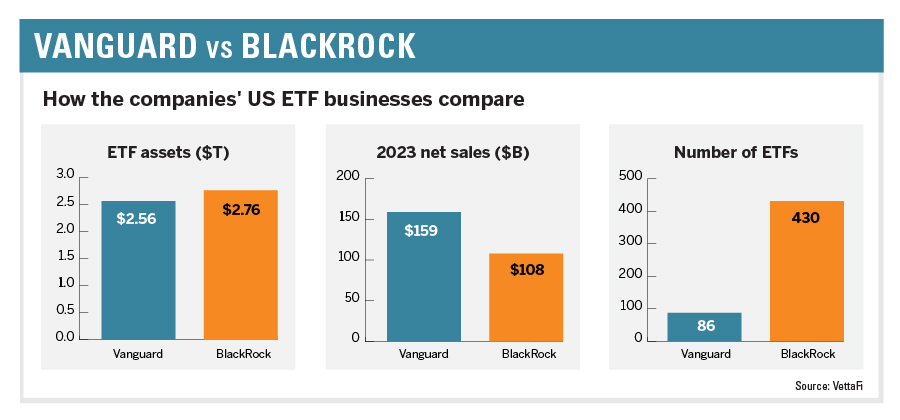

Vanguard shocked the business world Wednesday with news that its new leader will be a company outsider, the first time in the low-cost investment shop’s history.
It’s significant that the incoming CEO, Salim Ramji, led the ETF and index investing business at its biggest competitor in those areas, BlackRock.
Ramji, who left his role at BlackRock in January, will take over from current CEO Tim Buckley on July 8, Vanguard stated in its announcement. Ramji is joining the firm at a pivotal time for ETFs and mutual funds and as the firm’s customer service has long been under criticism from clients. Big asset managers including Vanguard have also been heavily scrutinized by politicians over their stances on the use of environmental, social, and governance factors in investment decisions.
A newcomer
Vanguard is known for promoting from within, often bringing on people early in their careers and grooming them for leadership roles.
Current CEO Tim Buckley “was there for 33 years and started as Jack Bogle’s research assistant. This is the first time that Vanguard is going outside of the [firm’s] family to bring somebody,” said Todd Rosenbluth, head of research at VettaFi. “They’re bringing in an experienced expert with a focus on growing ETF assets. With more than $2.5 trillion in ETF assets in the US, “Vanguard has already had success,” Rosenbluth said. “They continued to gain market share over the past five years in a growing and increasingly crowded ETF marketplace. They have begun to bring more of the broader firm’s capabilities into the ETF business, with active fixed income.”
Since it was founded in 1975 by John Bogle, each of the three succeeding CEOs has been a longtime employee at the Malvern, Pennsylvania-based company.
“It’s always been someone internal, and it’s always been someone who had a connection to Jack Bogle in some way,” said Jeff DeMaso, editor of The Independent Vanguard Investor.
“There might be some advantages to having someone with an outside perspective right now… Vanguard today is not what Vanguard was 20 or 30 years ago. It’s a pretty sprawling organization.”

With an outsider leading the firm for the first time, there will be questions about what happens to its corporate culture, DeMaso said.
“One advantage here is that Vanguard has a strong brand and a strong culture,” he said. Although the company has changed in various ways over the years, Ramji is well aware of what he is walking into, he said. “Even if Ramji wants to make some changes, it’s not a nimble ship anymore. It’s more of an ocean liner.”
Greg Davis, the firm’s president and chief investment officer, who likely was considered for the CEO job, could be seen as a kind of guardian of the firm’s culture, DeMaso said.
Ramji, who has been in the industry for 25 years, was in a senior leader role at BlackRock for the past 10 years, including his most recent position as global head of iShares and index investing.
“His contributions led to expanded investment access for tens of millions of investors, a more central role for ETFs in retirement and wealth portfolios and a more efficient bond market with ETFs as an enabling technology,” Vanguard stated in an announcement.
The company did not respond to a request for comment.
Not everything is the same
For years, Vanguard has been criticized over technology issues.
The company recently added a $25 charge for brokerage customers who opt to place orders over the phone rather than online.
“Do they need to be the highest-touch, white-glove service? No, not if folks expect them to be the low-cost provider,” DeMaso said. However, qualms over customer service, whether fair or not, has “finally started to erode the brand a little bit,” he said.
“I hear from subscribers who are leaving Vanguard because of the technology and service.”
Late last year it lowered fees on some of its most popular ETFs, shaving prices below comparable products from competitors such as BlackRock’s iShares and State Street’s SPDR.
The company’s reputation as an ultra-low-cost investment provider may not be totally compatible with a brokerage business, where the fees it uses are in line with competitors like Fidelity and Charles Schwab, DeMaso said.
“I would argue that Vanguard’s already been evolving over the past few years,” DeMaso said.
That includes news last month that the retirement plan behemoth has agreed to sell several of its small 401(k) business lines to Ascensus, a provider that specializes in the small-plan market. Of course, Vanguard remains one of the biggest retirement plan providers in the US, and its target-date funds are the most popular with 401(k) plans.
Separately, the company has also extended its partnership with fintech Vanilla to offer its intergenerational wealth and legacy planning to all of Vanguard’s ultra-high-net-worth clients of its Personal Advisor Wealth Management unit. The firm previously piloted Vanilla’s services with some clients.
ETF share class
Vanguard made a powerful advantage for itself in the ETF business two decades ago, patenting the concept of an ETF share class of existing mutual funds. However, that advantage will likely go away relatively soon. The company’s patent expired a year ago, and numerous asset managers have applied with the Securities and Exchange Commission for their own ETF share classes, including for actively managed funds. None have been approved so far, making Vanguard the only fund provider with that ability, which only applies to passively managed strategies.
Even without other shops potentially having their own ETF share classes, the advantage is diminishing, said Daniel Sotiroff, manager research senior analyst for passive strategies at Morningstar Research Services.
“Money is flowing out of actively managed mutual funds into very cheap ETFs, and oftentimes that is broad index stuff,” he said. “If you’re an active manager and bolting on an ETF share class, maybe it helps and slows outflows.”
Low cost remains a dominant factor for investors, he said.
“The bigger component of it is the broadly diversified cheap stuff that’s performing better,” he said. “Vanguard has a big leg up on that… That’s the bread and butter of their ETF lineup.”
Cryptic future
While Vanguard has led the industry in some developments, there is a recent one it has sat out on – cryptocurrency ETFs. This year, asset managers flocked to launch spot-price Bitcoin ETFs, as the SEC gave its long-awaited approval for such products.
As the global head of iShares during BlackRock’s quest to bring its product to the market, there has been speculation already that Ramji would move Vanguard in that direction. The iShares Bitcoin Trust ETF, with more than $17 billion in assets, has been the hottest seller by far in the category.
However, Ramji reportedly said in an interview this week with Barron’s that he would not change course, hearing from CIO Greg Davis about how such a product would be inconsistent with Vanguard’s investment philosophy.
“Even if he’s a proponent of Bitcoin and thinks Vanguard has a big mistake, I would be surprised if that was his first act to reverse its stance,” DeMaso said. “If I’m in his shoes… I’d rather spend my energy trying to resolve their technology and service issues and get some goodwill with shareholders.”
Another issue Ramji will have to address is Vanguard’s priority for overseas expansion, he noted. Currently, the company’s international business is just a small fraction of the size of its US presence by assets.
Additionally, Vanguard appears to have been slightly more successful than some of its larger peers in directing attention on sustainable investing away from it. No firm has been targeted more prominently by Republicans than BlackRock, some of whom have accused the company of boycotting the fossil fuel industry or using its sway to promote what it sees as the greater social good.
BlackRock’s program to give fund investors some say in how their shares are voted in proxies may have helped take some of the heat off the company, but it wasn’t enough to keep states like Texas from divesting some assets from it.
In its announcement, Vanguard noted Ramji’s leadership of “the implementation of a voting choice platform, which democratizes client access to the proxy voting process.”
And on the other side, companies like BlackRock and Vanguard have been targeted by environmental groups over their investments in the oil and gas industry. Vanguard was the first big firm to leave the Net Zero Asset Managers initiative, a decision that came amid rising pressure from conservative politicians.
Still, Vanguard and its peers still offer products with a sustainable investment focus, and most shareholders seem to want the company to provide fund investors with choices, DeMaso said.
“Vanguard is still very much in the crosshairs,” he said. “It’ll be interesting to see what kind of course Ramji tries to plot with this.”

Eliseo Prisno, a former Merrill advisor, allegedly collected unapproved fees from Filipino clients by secretly accessing their accounts at two separate brokerages.

The Harford, Connecticut-based RIA is expanding into a new market in the mid-Atlantic region while crossing another billion-dollar milestone.

The Wall Street giant's global wealth head says affluent clients are shifting away from America amid growing fallout from President Donald Trump's hardline politics.

Chief economists, advisors, and chief investment officers share their reactions to the June US employment report.

"This shouldn’t be hard to ban, but neither party will do it. So offensive to the people they serve," RIA titan Peter Mallouk said in a post that referenced Nancy Pelosi's reported stock gains.
Orion's Tom Wilson on delivering coordinated, high-touch service in a world where returns alone no longer set you apart.
Barely a decade old, registered index-linked annuities have quickly surged in popularity, thanks to their unique blend of protection and growth potential—an appealing option for investors looking to chart a steadier course through today's choppy market waters, says Myles Lambert, Brighthouse Financial.
